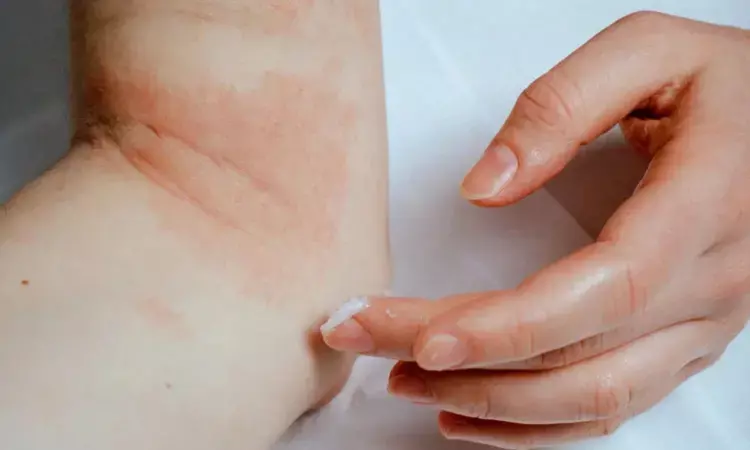- Home
- Medical news & Guidelines
- Anesthesiology
- Cardiology and CTVS
- Critical Care
- Dentistry
- Dermatology
- Diabetes and Endocrinology
- ENT
- Gastroenterology
- Medicine
- Nephrology
- Neurology
- Obstretics-Gynaecology
- Oncology
- Ophthalmology
- Orthopaedics
- Pediatrics-Neonatology
- Psychiatry
- Pulmonology
- Radiology
- Surgery
- Urology
- Laboratory Medicine
- Diet
- Nursing
- Paramedical
- Physiotherapy
- Health news
- Fact Check
- Bone Health Fact Check
- Brain Health Fact Check
- Cancer Related Fact Check
- Child Care Fact Check
- Dental and oral health fact check
- Diabetes and metabolic health fact check
- Diet and Nutrition Fact Check
- Eye and ENT Care Fact Check
- Fitness fact check
- Gut health fact check
- Heart health fact check
- Kidney health fact check
- Medical education fact check
- Men's health fact check
- Respiratory fact check
- Skin and hair care fact check
- Vaccine and Immunization fact check
- Women's health fact check
- AYUSH
- State News
- Andaman and Nicobar Islands
- Andhra Pradesh
- Arunachal Pradesh
- Assam
- Bihar
- Chandigarh
- Chattisgarh
- Dadra and Nagar Haveli
- Daman and Diu
- Delhi
- Goa
- Gujarat
- Haryana
- Himachal Pradesh
- Jammu & Kashmir
- Jharkhand
- Karnataka
- Kerala
- Ladakh
- Lakshadweep
- Madhya Pradesh
- Maharashtra
- Manipur
- Meghalaya
- Mizoram
- Nagaland
- Odisha
- Puducherry
- Punjab
- Rajasthan
- Sikkim
- Tamil Nadu
- Telangana
- Tripura
- Uttar Pradesh
- Uttrakhand
- West Bengal
- Medical Education
- Industry
Crisaborole may Sustain Effective Control in Atopic Dermatitis, finds study

Managing atopic dermatitis (AD) often proves to be a persistent challenge in dermatological practice, with treatments frequently falling short in providing long-lasting relief. However, the recent findings of the CrisADe CONTROL phase III study highlights a potential breakthrough in AD management. The findings were published in the Dermatology and Therapy journal.
The study encompassed the participants aged three months and older with mild to moderate AD and focused on the efficacy of once-daily (QD) application of crisaborole following initial treatment success with crisaborole twice daily (BID). The investigation added data on the maintenance of response by examining flare-free periods and the frequency of flares when compared to the participants receiving a vehicle.
This study engaged in an exploratory analysis to evaluate the various endpoints like the time to response during the open-label run-in period and the maintenance of response during the double-blind maintenance period. These analyses also looked into the subgroups based on age and duration of crisaborole BID treatment during the run-in period.
During the open-label run-in phase, the median time to response was at 41.5 days which indicated a marked period of treatment before observing significant improvement. Throughout the subsequent double-blind maintenance period spanned from week four to week 52, the participants who received crisaborole demonstrated a higher proportion of maintained response when compared to the participants who received the vehicle. This discrepancy in maintenance of response persisted up to week 36 with statistical significance (P < 0.05) that reinforces the efficacy of crisaborole.
The duration of flare periods during the maintenance phase showed minimal deviation between the crisaborole and vehicle-treated groups which hinted at the potential of crisaborole to reduce the severity and duration of AD flares. Also, a lower percentage of crisaborole-treated individuals who underwent flares with a severity score of 2 or higher when compared to their counterparts who were receiving the vehicle.
The study paints a promising picture for both adult and pediatric AD sufferers which emphasized the efficacy of crisaborole QD in maintaining disease control over an extended period. This evidence underlines the significance of early treatment success with crisaborole BID which serves as a precursor to sustained relief with QD application.
Reference:
Eichenfield, L. F., Stein Gold, L. F., Lynde, C., Guenther, L., Greenberger, S., Chu, C.-Y., Ghodsi, Z., Vlahos, B., Sanders, P., Cha, A., & Canosa, J. M. (2024). Maintenance of Investigator’s Static Global Assessment Response with Once-Daily Crisaborole in Participants with Mild to Moderate Atopic Dermatitis. In Dermatology and Therapy (Vol. 14, Issue 4, pp. 875–892). Springer Science and Business Media LLC. https://doi.org/10.1007/s13555-024-01129-9
Neuroscience Masters graduate
Jacinthlyn Sylvia, a Neuroscience Master's graduate from Chennai has worked extensively in deciphering the neurobiology of cognition and motor control in aging. She also has spread-out exposure to Neurosurgery from her Bachelor’s. She is currently involved in active Neuro-Oncology research. She is an upcoming neuroscientist with a fiery passion for writing. Her news cover at Medical Dialogues feature recent discoveries and updates from the healthcare and biomedical research fields. She can be reached at editorial@medicaldialogues.in
Dr Kamal Kant Kohli-MBBS, DTCD- a chest specialist with more than 30 years of practice and a flair for writing clinical articles, Dr Kamal Kant Kohli joined Medical Dialogues as a Chief Editor of Medical News. Besides writing articles, as an editor, he proofreads and verifies all the medical content published on Medical Dialogues including those coming from journals, studies,medical conferences,guidelines etc. Email: drkohli@medicaldialogues.in. Contact no. 011-43720751


